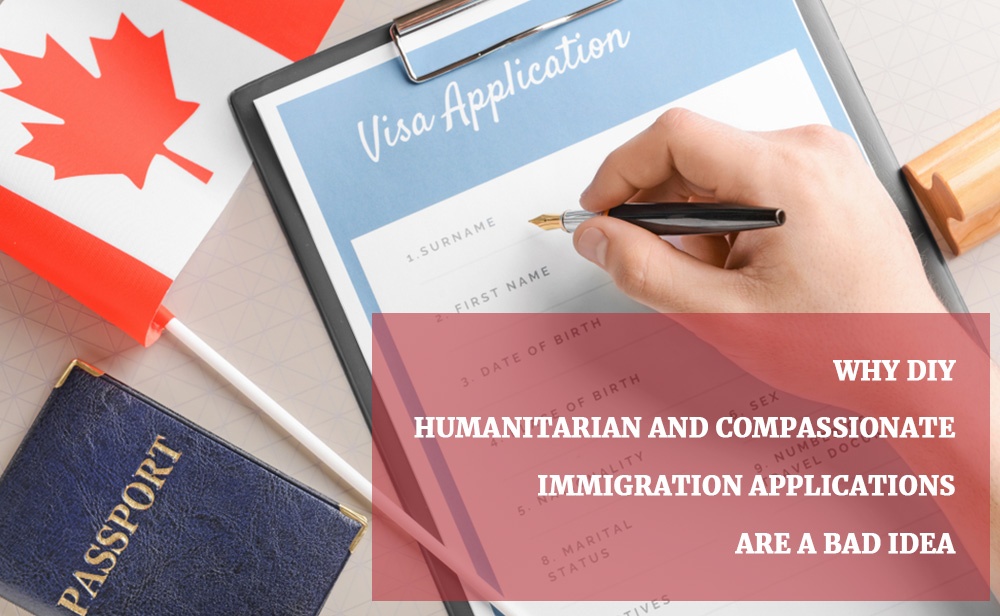Why DIY Humanitarian And Compassionate Immigration Applications Are A Bad Idea

While working in Canada comes with several opportunities, settling here permanently can guarantee you and your family better standards of living and a brighter future. However, obtaining permanent residence in Canada in some cases requires sponsorship and in other cases, financial requirements have to be met that can amount to a significant sum.
Fortunately, if you have been living and working in Canada for a while as a foreign national and want to become a permanent resident but do not qualify for any of the other categories, you have the option of applying for permanent residence under Humanitarian and Compassionate grounds (“H&C”). An H&C application asks the government of Canada to make an exception to the rules and allow you to be granted permanent residence status in Canada due to compassionate reasons.
Keep in mind that you are eligible for a Humanitarian and Compassionate consideration even if you are a foreign national living in Canada without valid immigration status. For example, if you have overstayed your temporary resident visa or were denied a refugee claim over a year ago (with some exceptions).
If you belong to this category we believe that it’s not a good idea to DIY your application due to the complexities of this type of application; however, if you cannot afford to hire a representative to assist you with your application, here are some factors that H&C decision-makers will consider:
1. Possibility of hardships if you leave Canada
Before you apply for immigration through a Humanitarian and Compassionate application, you need to determine if you will face difficulties should you be forced to leave Canada. By hardships and difficulties, we are referring to returning to family violence or an abusive relationship, chances of living in poverty, lack of medical care, lack of family support in your home country, and negative impacts on your family and friends in Canada. If any of these outcomes are likely to occur, you can state them in your application.
2. Strong connections/establishment in Canada
Another aspect that will aid your Humanitarian and Compassionate application is strong connections and your establishment in Canada. Establishment can relate to how long you’ve been living in Canada, your volunteer work and community connections in Canada, your pursuit of education in Canada, employment history and your past education and training in Canada while strong connections can include business connections, community connections and relatives and family members in Canada. The more connections you have with the country, the higher your chances of success with this immigration option will be.
3. The best interest of your child
If any of your children or children that are connected to you, are likely to suffer should you be removed from Canada, applying for Humanitarian and Compassionate consideration is highly recommended. The sufferings of your children can relate to poor emotional wellbeing, physical and health safety, social and cultural wellbeing, and personal development. It doesn’t matter if your children are Canadian born or born outside of Canada.
Conclusion
Besides determining if these factors apply to you, you also need to know how to substantiate them with the relevant proof. Without proper proof, your application will be rejected. As a result, it is very important to provide a substantial amount of evidentiary support.
Apart from evidence, it is equally essential to be aware that going down the DIY route and trying to represent yourself in the Humanitarian and Compassionate application process is risky. Most applications are best presented with legal submissions and affidavit evidence, which requires preparation through an immigration professional as they aren’t easy for a layperson to produce.
Moreover, a licensed Canadian immigration consultant or lawyer can help you prepare a strong application that would stand a better chance of being approved. They are aware of the requirements under this immigration option and can help you avoid mistakes and errors that could negatively impact your chances of being approved.
As a licensed immigration consultant in Toronto, Ontario, I Jullane B. Ebanks, of Peace of Mind Immigration and Administrative Services can help you prepare and submit your application with ease. After facing the challenges of immigration myself, I realized that many people like me lacked good and affordable representation. To help simplify the process for other individuals and families looking for a brighter future in Canada, I decided to become a Regulated Canadian Immigration Consultant (“RCIC”).
Since the inception of my immigration consultancy, I have successfully helped several clients move to Canada permanently. I also have a 90% approval rate in this category as I am honest with my clients about their chances of success. With every immigration case, I like to take the time to get to know my client, their aspirations, and challenges. This helps me direct them to the best immigration programs/options and I deliberately offer them lower fees and flexible payment plans based on their budget and needs.
To learn more about my immigration services, please click here or get in touch with me by clicking here.